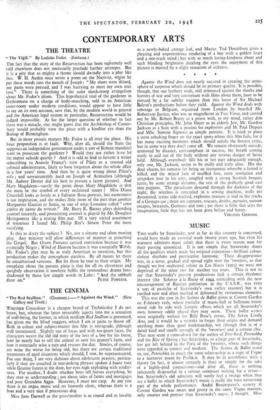THE CINEMA •
" The Red Stallion." (Gaumont.)—" Against the Wind." (New Gallery and Tivoli.)
WHETHER Cinecolour is a cheaper brand of Technicolor I do not know, but, whereas the latter invariably injects into me a sensation of well-being, the former, in which medium Red Stallion is presented, has given me the blind staggers, which I am at pains to throw off. Both in colour and subject-matter this film is retrograde, although well intentioned. , Slightly out of focus and with sea-green faces, the characters weave the old old story of the love of a boy for his horse, how he nearly has to sell the animal, to save his granny's farm, and how it eventually wins a race and rescues the day. Stories, of course, are none the worse for being old, but there are certain traditional treatments of aged situations which should, I vow, be superannuated. For one thing, I am very dubious about adolescent prayers, particu- larly if they are couched in tear-jerking phrases spoken a haute voix while Granny listens at the door, her eyes nigh exploding with tender- ness. For another, I doubt whether boys tell horses everything, be they ever so understanding; not about sales of farms and mortgages and poor Grandma Aggie. However, I must not carp. At any rate there is no organ music and no heavenly choir, whereas there is a bear and a very nice if precocious dog.
Miss Jane Darwell as the grandmother is as round and as lovable as a newly-baked cottage loaf, and Master Ted Donaldson gives a pleasing and unpretentious rendering of a boy with a golden heart and a one-track mind ; but with so much loving-kindness about and such blinding brightness dazzling the eyes the enjoyment of this picture is marred by a slight sensation of sickness.
* *
Against the Wind does not nearly succeed in creating the atmo- sphere of suspense which should be its primary quality. It is possible, though, that our leathery souls, still armoured against the shocks and horrors of war and very conversant with films about them, have to be pierced by a far subtler weapon than this latest of Sir Michael Balcon's productions before they yield. Against the Wind deals with sabotage in Belgium, organised from London by bearded Mr. Robertson Justice, who was so magnificent in Vice Versa, and carried out by Mr. Robert Beatty as a priest with, to my mind, rather dim Christian principles, Mr. John Slater as an elderly Jew, Mr. Gordon Jackson as a Scot with a passion for explosives and M. Paul Dupuis and Mlle. Simone Signoret as simple patriots. It is hard to place a stern rebuking finger on the exact spots where this film fails, for it has many exciting moments which should satisfy the fiercest critic, but in some way they don't come off. We remain obstinately outside, unmoved by disaster, untriumphant in success, the breath coming easily in and but of the body without any serious danger of being held. Although everybody fills his or her part adequately enough, only one, Mr. Jackson, seems to be really and truly alive. His shy dour charm, his remorse for being an instrument whereby a friend is killed, and the mixed look of muffled fear, stern resolution and unspoken love in his. eyes, coupled with a strong Scottish brogue, turns, by some strange alchemy, the rest of the perfectly good cast into puppets. The parachutes descend through the darkness of the night, the wireless is concealed in a sewing machine, walls are dynamited, trains side-tracked, explosive manure is laid in the tracks of a Gestapo car ; there are captures, rescues, deaths, pursuits, narrow escapes, betrayals, Germans and love ; yet there is little that stirs the imagination, little that has not been done before and better.
VIRGINIA GRAHAM.






























 Previous page
Previous page